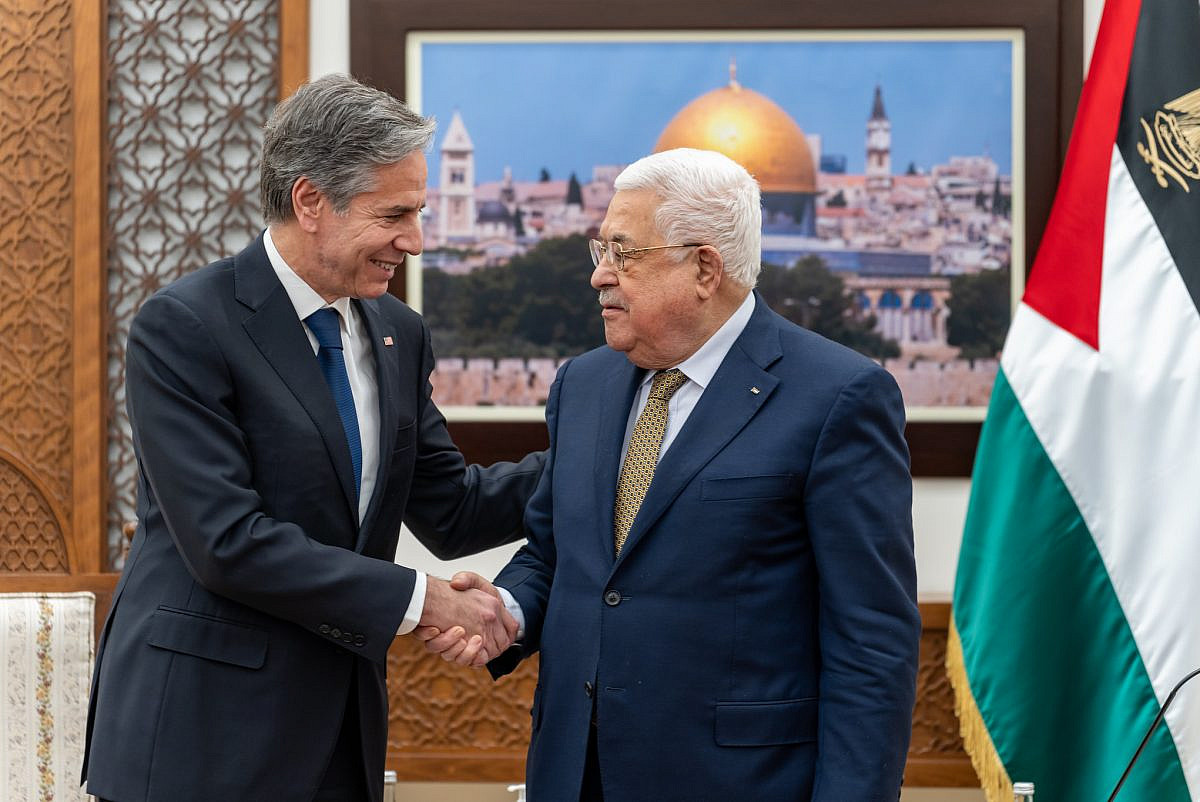Since the Hamas-led October 7 attacks on southern Israel, the occupied West Bank has experienced a surge in violence and volatility. Over the past three months, with the world’s attention on the Gaza Strip amid Israel’s ongoing bombardment, Israeli soldiers and settler militias have killed more than 300 Palestinians in the West Bank, including over 80 children, while more than 4,000 Palestinians have been detained.
Settlers have also intensified their harassment and violence against Palestinians in a calculated attempt to seize their land, forcibly displacing at least 16 isolated communities in recent weeks. The territory remains under a strict lockdown, checkered with military checkpoints that hinder movement for Palestinians between cities and towns.
For many Palestinians, what has been just as crippling as the tightening grip of the occupation is the sense of total absence and inaction from their own leaders. The Palestinian Authority (PA), led by President Mahmoud Abbas, has mostly given shy condemnations of Israel’s escalations and collective punishment, lacking any real ability to confront them.
This was especially evident in the wake of a two-day incursion by Israeli forces into the northern West Bank city of Jenin last month, which effectively turned the city into a “mini Gaza,” as many residents described it. That operation has been accompanied by several more military raids into other West Bank cities in recent weeks, including Tubas and Tulkarem.
A few days before Israel’s assault on Jenin, Mustafa Sheta, the director of the city’s Freedom Theater, told +972 that the people of Jenin feel abandoned, especially when all eyes — including their own — are fixed on Gaza. “The PA is silent. It is neither reassuring us nor healing wounds,” he said. Sheta was later arrested by Israeli forces during the Jenin operation, and sent to Megiddo Prison where he will spend six months in administrative detention — imprisonment without charge or trial.
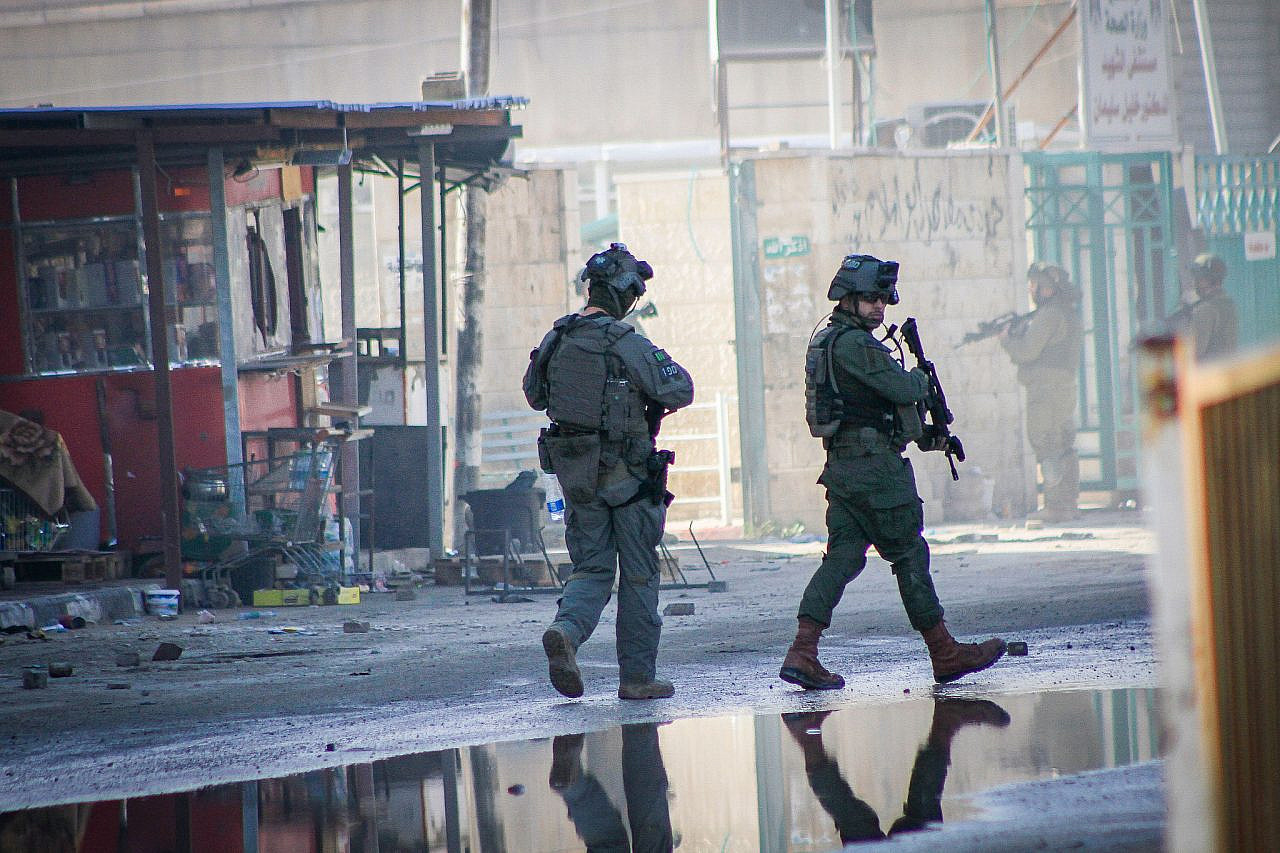
The sentiment Sheta expressed was echoed in a recent poll conducted by the Palestinian Center for Policy and Survey Research (PCPSR) in the West Bank and Gaza. According to the poll’s findings, support for Hamas has surged to 44 percent among Palestinians in the West Bank, compared to just 12 percent in September. Support for Abbas, his Fatah party, and the PA have dropped significantly: more than 90 percent demand the president’s resignation, while support for the dissolution of the PA — nearly 60 percent across the West Bank and Gaza — is the highest it’s ever been in a PCPSR poll.
Mounting public discontent over the PA’s deafening silence in the face of Israel’s brazen bombardment of Gaza, intensifying raids into West Bank cities, and assassination of top Palestinian leaders is adding to years of frustration over persistent accusations of corruption, the PA’s failure to pay its employees, and the sense that it is increasingly disconnected from the lives of its constituents. More than ever before, there is a stark perception that the PA is completely irrelevant.
As such, for many Palestinians, the current leadership is unable to represent the aspirations and concerns of the people, hindering meaningful steps toward ending the current war on Gaza and advancing their struggle as a whole. Many insist that it is imperative for a new leadership to realign its actions with the pressing needs of the public, and to assert Palestinian agency amid the cacophony of discussions for the “day after.” The PA and its leaders, though, are doing all they can to remain at the center of these designs.
No more business as usual
Since Oct. 21, Israeli military raids into Jenin have become routine, with near-nightly incursions and clashes with resistance fighters based in the refugee camp. Of the nearly 500 Palestinians killed in the West Bank over the course of 2023 — the highest number for one year since the Second Intifada — at least 137 were from Jenin. But aside from its rehearsed rhetoric of condemnation and calls for international protection, the mass destruction of the city has not pushed the PA to take action.
Sheta from the Freedom Theater, describing the situation in Jenin before the two-day raid, said that “the people of the camp are completely overwhelmed by the nightly military incursions,” leaving the already weary refugees even more bereaved and their infrastructure in ever-worsening conditions.
“We don’t know when this will end,” he lamented. “The military says the operation aims to uproot resistance from the camp, but that is not a realistic goal. They can’t wipe out resistance from an oppressed people — killing leads to killing, and violence brings violence.”
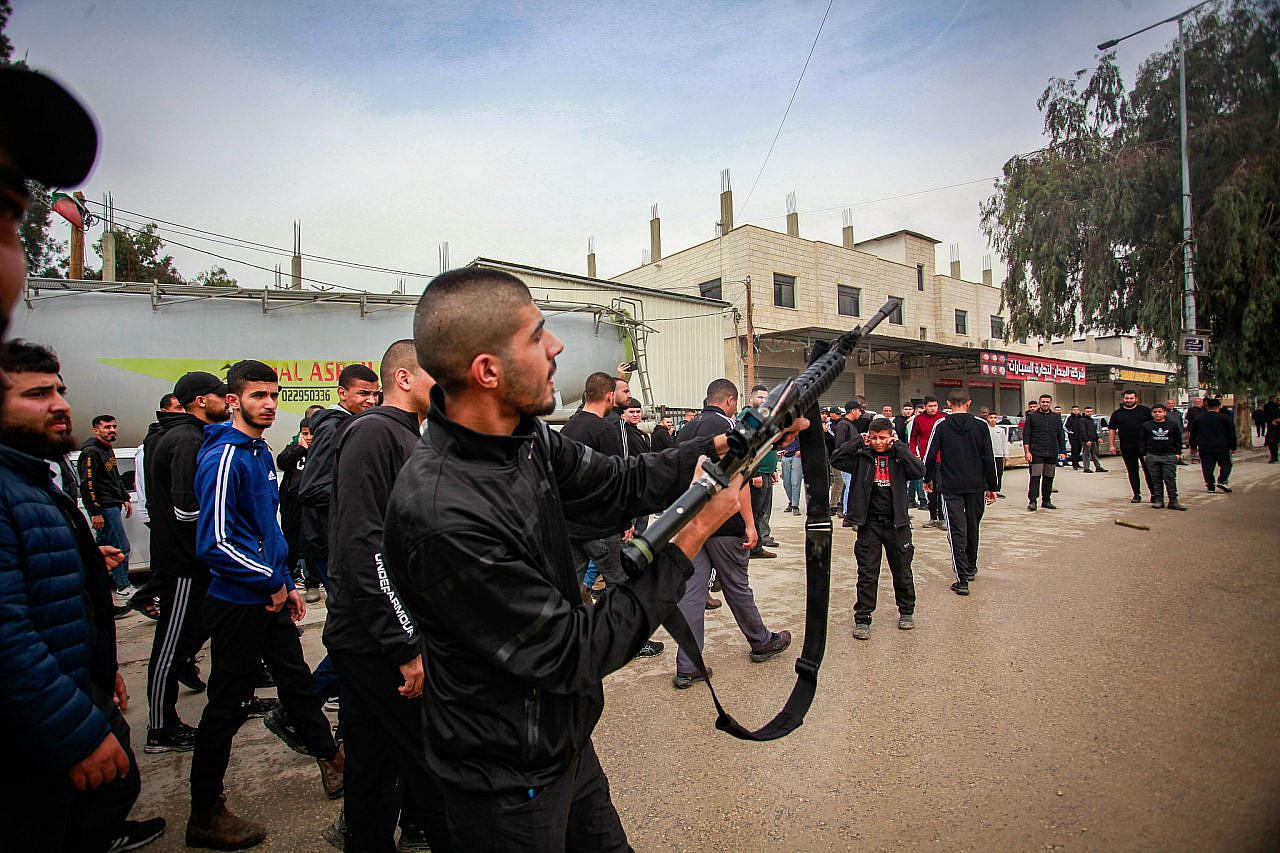
Living amid such turmoil, Palestinians are feeling the price of the leadership vacuum that has plagued their politics for years. Ashraf Ajrami, a political analyst and writer, criticized the PA’s current approach, describing it as “incapacitated, without popular legitimacy.” He noted how, at an event dedicated to Palestinian political prisoners who were released in exchange for Israeli hostages taken by Hamas on October 7, the PA minister for prisoners’ affairs, Qadura Faris, was shouted down by attendees.
Ajrami accused the PA leadership, particularly those close to President Abbas, of conducting “business as usual” in the face of the Gaza catastrophe. He pointed to the lack of any meaningful mobilization in the West Bank to support Gaza — all the more conspicuous given previous actions taken by the PA in other instances, including sending 40 firefighters and 8 trucks to help quell forest fires near Haifa in 2016.
Despite his critiques of both Fatah and Hamas, Ajrami believes there is a potential way forward through the establishment of an independent, technocratic commission to step in for a transitional period, both to rebuild Gaza and to pave the way for elections. He underscores the current moment as a potentially unique opportunity, asserting that the world is, at last, genuinely interested in seeing a Palestinian state come to fruition.
“The two-state solution, as based on the political parameters established by the international community, is being seriously addressed for the first time since [U.S. President Bill] Clinton,” Ajrami said. But seizing that opportunity, he stressed, requires a major shift in the leadership’s approach.
‘We need someone who can unite people’
There is popular sentiment that a widely respected political figure is needed to break this paralysis. In a small coffee shop filled with cigarette smoke in Al-Bireh, a town next to Ramallah, Abu Othman, a Palestinian customer, articulated the view of many: “We can’t keep asking ‘what’s next?’ with the current leadership. We need a figure like Abu ‘Ammar,” he said, referring to the late Palestinian leader Yasser Arafat. “Someone who can unite people despite their differences.”
The most prominent such leader is Marwan Barghouti, a political prisoner and longtime leader in Fatah who, according to the recent PCPSR poll, would defeat both Abbas and Hamas leader Ismail Haniyeh if elections were held today. Gaining prominence as a student activist during the First Intifada, Barghouti eventually became involved in Fatah’s armed wing, Al-Aqsa Martyrs’ Brigade. He was arrested by Israel during the Second Intifada, and a military court sentenced him to five life terms in prison for his involvement in attacks on Israelis.
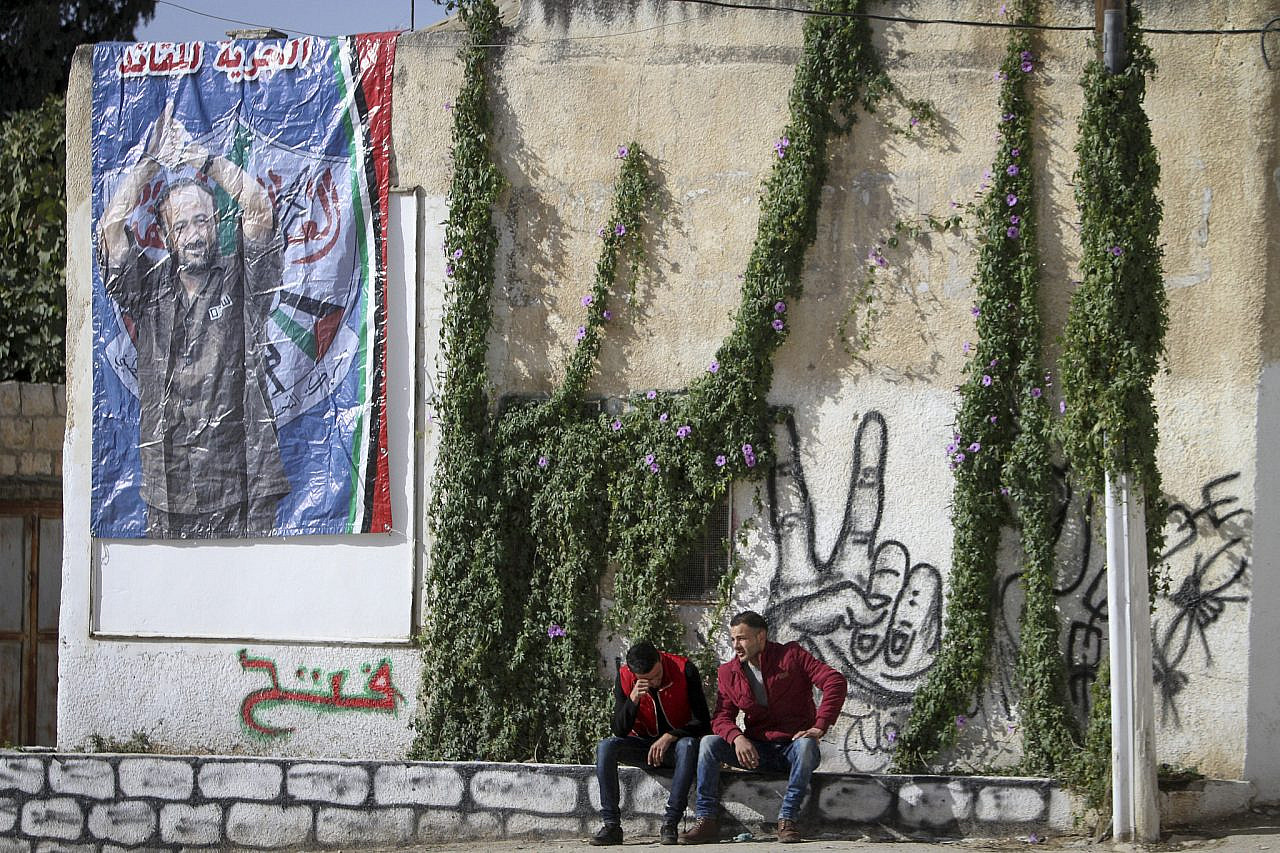
From behind bars, Barghouti has remained active in the prisoners’ movement and wider Palestinian politics, publishing articles and statements that stress the need for national reconciliation. Often referred to as the “Mandela of Palestine,” after the South African leader and political prisoner, Barghouti has retained extensive popular support as a future leader of the national movement.
Because of Barghouti’s imprisonment, though, some Palestinians are also looking to established figures within the PA as potential leaders. Mahmoud Aloul, Fatah’s deputy chairperson since 2018, has been regarded as one such candidate.
Imprisoned and deported from the West Bank to Jordan after the 1967 war, Aloul returned to Palestine in 1995 under the framework of the Oslo Accords as a key advisor to Arafat, who later appointed him as the governor of Nablus, a position he held for 10 years and which attained him a reputation as a man of the people. Putting his military background behind him, Aloul became an advocate for popular resistance, including demonstrations and boycotting Israeli products. He now oversees Fatah’s local branches as the head of the party’s Commission for Mobilization and Organization.
From a modest office open to the public, Aloul sits at the head of a long table covered with notebooks, pens, his eye glasses, and his cell phone. Recognizing the gravity of the consequences of the Israel-Gaza war, Aloul told +972: “The priority now is not to defend the PA or own it. The priority is to regain [the trust of all] the Palestinian people and their fight for freedom. This war is against the entire Palestinian nation — the genocide in Gaza and the daily killings and destructions in the West Bank.”
While acknowledging the impact of the Fatah-Hamas division on the Palestinian people, Aloul said: “What I personally feel is that we are ‘knitting the wrong basket’ when we speak of the popularity of factions. The priority should be the vision that prevents Israel from assassinating the dreams of our people … to overcome any threats to independent Palestinian decisions. We are exerting big efforts to end this [division],” he added, without further elaboration.
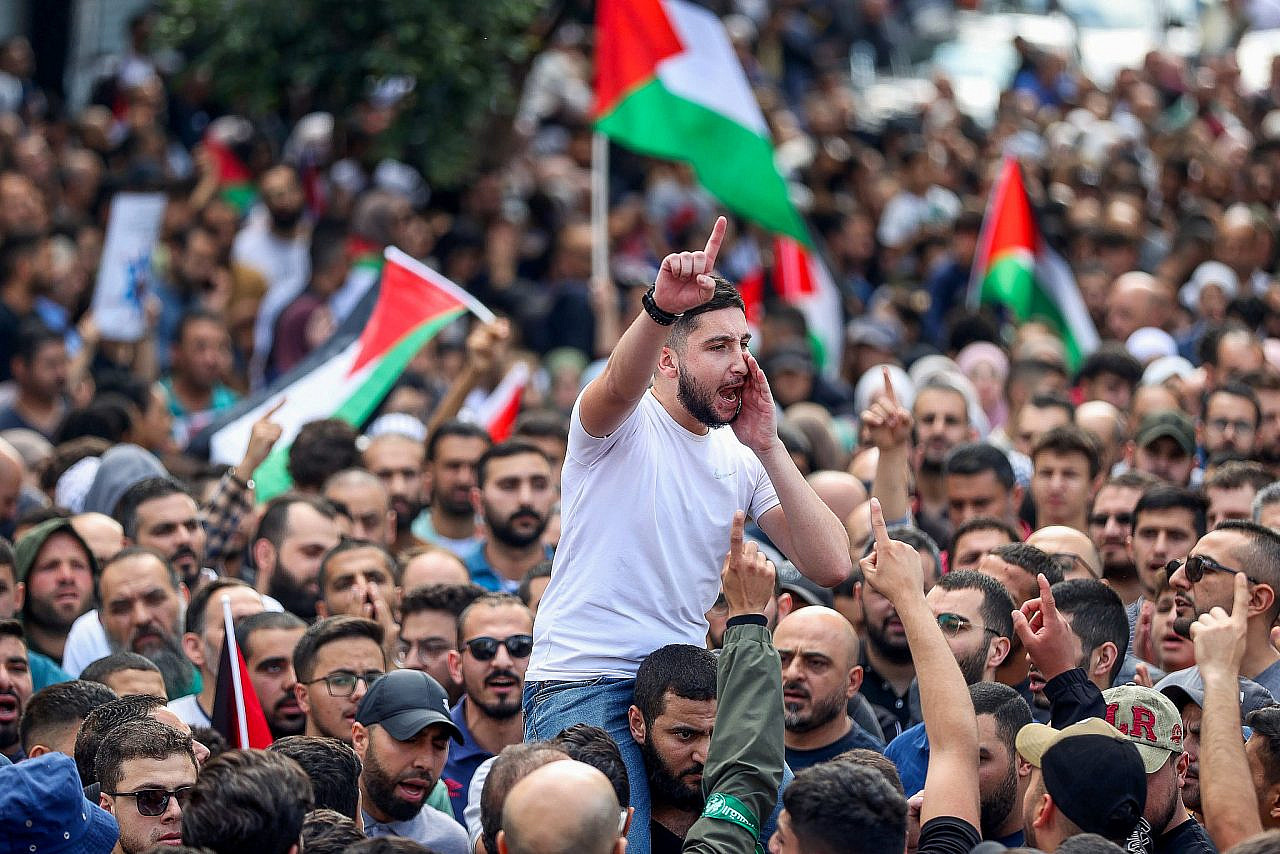
“This is why we are doing our best to reconnect with the people and to create an atmosphere for elections — this is what we need,” he continued. “No one is pretending that the situation is rosy; there is a lot we need to rectify, especially our relationship with our people.”
Aloul addressed the Palestinian public through recorded voice messages published on his official Facebook page on Oct. 13 and on Nov. 8, in which he stressed that the priority of the Palestinian leadership is to end the Israeli aggression on both Gaza and the West Bank. In his second recording, Aloul spelled out a way forward as seen by the Palestinian leadership: a unified PLO stance that includes Hamas and Islamic Jihad, both of which have long been excluded from the organization. Plans are reported to be taking effect toward serious talks for such a unity arrangement.
But many Palestinians want more than just another elitist deal. Fadi Quran, a 35-year-old political activist, believes that a new and inclusive Palestinian-borne initiative is needed to transcend the divided factions. To complement these political shifts at the top, Quran envisions a grassroots movement, akin to the First Intifada, in which people can also partake in political work from the ground up. “The energy is there, the public support is there, and the ideas are there. They just need to be organized,” he said. “There’s a decentralization, where people are beginning to create their own networks of action,” Quran continued. “And hopefully, that continues to grow and blossom into something.”
Jostling for position in Gaza’s ‘day after’
In recent weeks, government figures from Arab states including the United Arab Emirates, Qatar, and Egypt, as well as the United States, United Kingdom, European Union members, and Israel have been meeting behind closed doors to contemplate various post-war scenarios for Gaza, according to diplomatic sources familiar with the discussions. Notably absent from these deliberations is any direct engagement with the PA or Hamas.
Diplomats who spoke to +972 on condition of anonymity explained that the envisioned scenarios leaned toward establishing a new administrative entity, expressly excluding Hamas, which is designated as a terrorist organization by the United States and the EU. Much criticism has also been directed at the Fatah-led PA in these discussions, branding it as corrupt and anti-democratic.
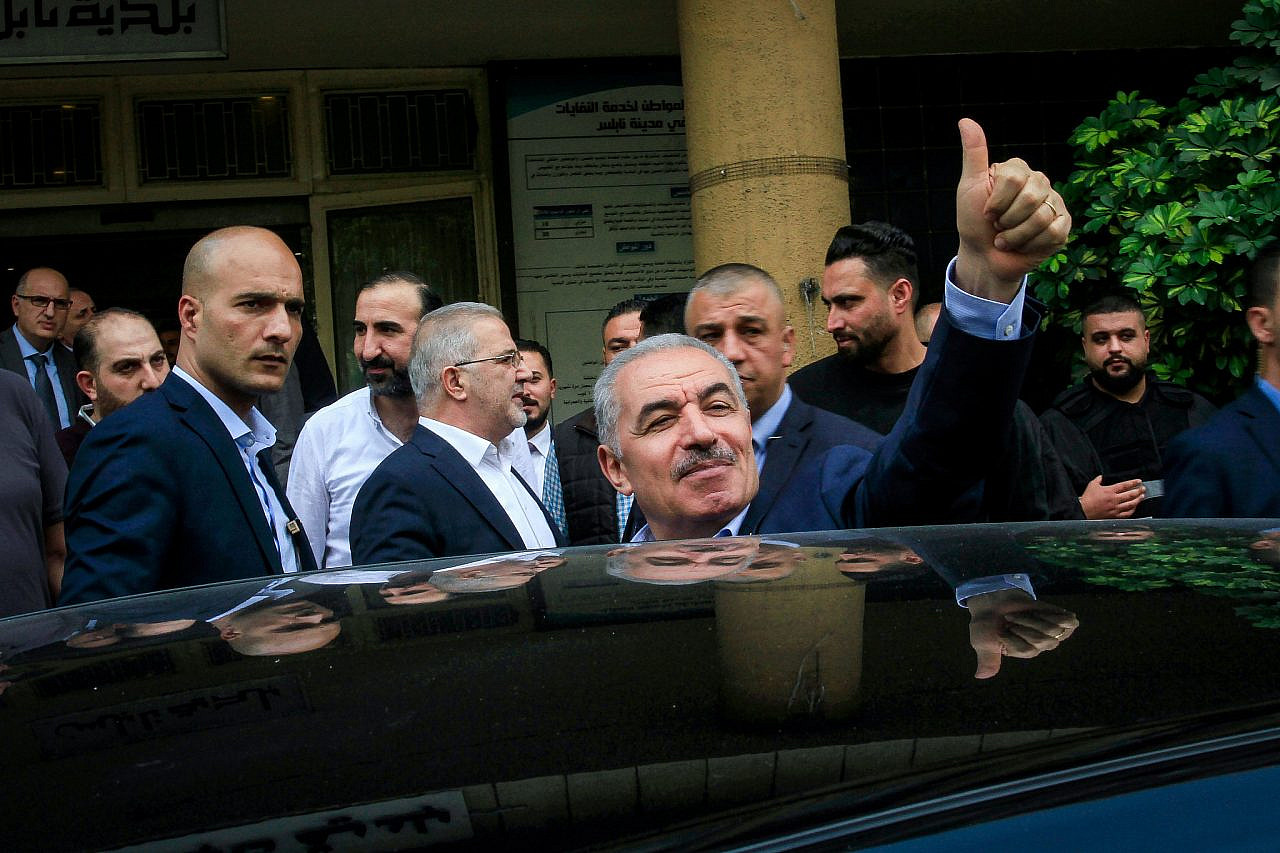
The diplomatic sources described various proposals for the “day after” that have been under discussion in these meetings, all of which are aimed at bringing about a peaceful transition toward a democratically elected leadership while allowing Gaza to be rehabilitated. There is broad appetite for a transitional period in which some kind of force would be configured to govern after the war ends and until elections can be held; this force, the sources explained, would mainly comprise figures from the Palestinian security apparatus and established community figures.
There are also discussions around reducing the size of the Gaza Strip through creating an Israeli military buffer zone along the “Philadelphi Corridor” — a territory that runs along the border between Gaza and Egypt — which Israel now insists on controlling. Egypt has not yet objected to this idea.
A three-stage Egyptian proposal for ending the war, which has become known locally as “the Egyptian Initiative,” was gaining momentum in recent weeks, before being pronounced dead following the assassination of the deputy head of Hamas’ political bureau, Saleh al-Arouri, in Beirut on Jan. 2.
The initiative, supported by Qatari mediators, had proposed a gradual end to hostilities, starting with a temporary truce that would allow for the release of Israeli hostages in exchange for Palestinians held in Israeli prisons, and leading eventually to a permanent ceasefire. It also envisioned a change in leadership in Gaza, such that Hamas would no longer rule the Strip, but made no mention of the PA.
The PLO’s executive committee, chaired by Abbas, publicly rejected the initiative last week in its initial form. Committee member Bassam al-Salhi told +972 that the body is primarily focused on “an immediate ceasefire and a framework for a comprehensive political track to end the occupation, then we can talk about the domestic issues, including unity, reforms and elections. We don’t have guarantees that the international community would recognize the results of any elections we have based on what we saw in 2006,” he added.
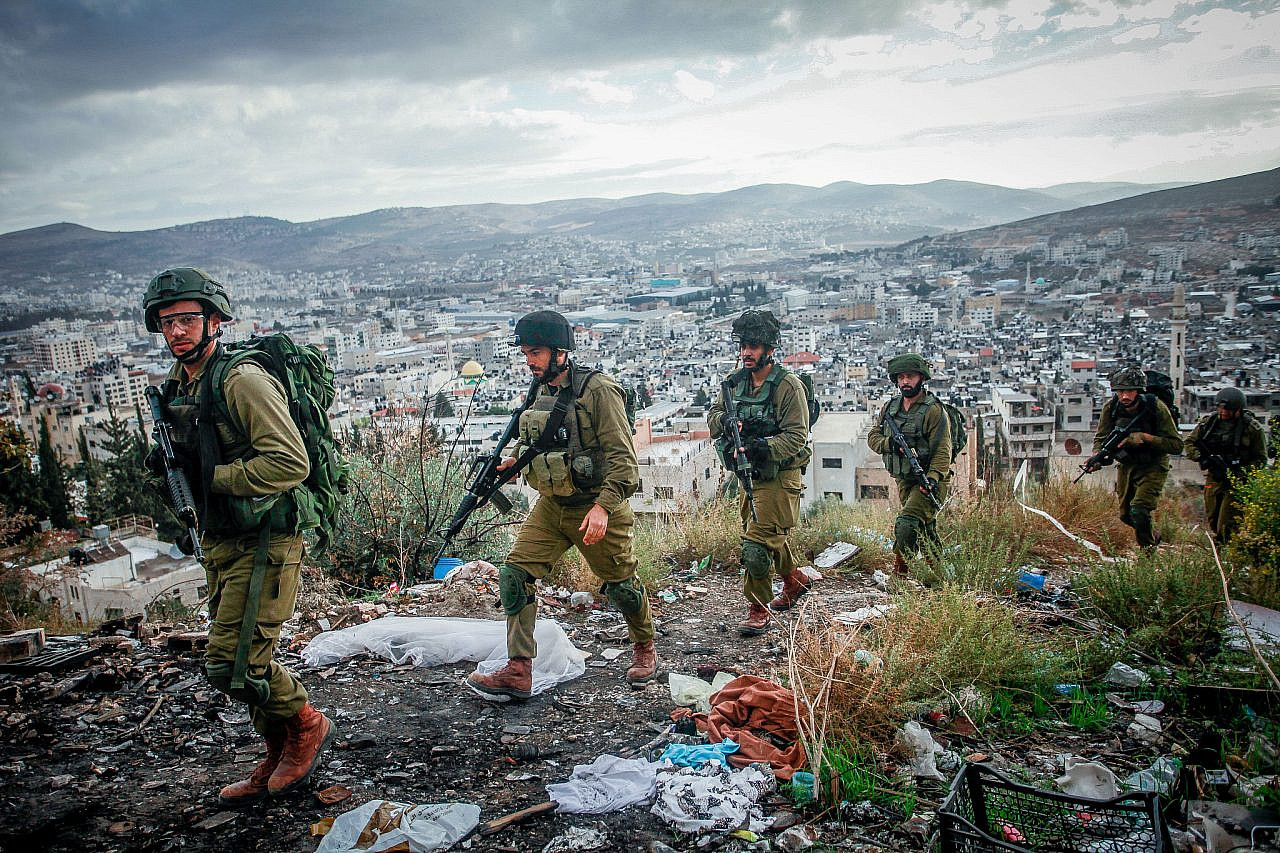
Behind the scenes, however, the PA received a lifeline: a senior Fatah official told +972 that Egypt had assured them the PA’s role in the transition process was understood by all parties without needing to be made explicit.
The PA then requested an amendment to the proposal, which Egypt accepted, for a national unity government to be established through a reconciliation agreement between the Palestinian factions, rather than a technocratic body. PA officials feared that the latter scenario would enable the return of public dissidents of Abbas such as Abu Dhabi-based Mohammed Dahlan and former PLO representative Nasser al-Kidwa, the nephew of Yasser Arafat.
Seeing this initiative as a means to remaining relevant, and thus seeking to keep the Americans onside, the PA also requested additions to the proposal with regard to reforms to its governance, security, judicial, and administrative mechanisms. U.S. officials had made clear to the PA that these were its demands, along with the idea of retraining a PA security force that would be responsible for security in Gaza after the war. Egypt was thought to be amenable to these changes, prior to further talks being aborted after the assassination of al-Arouri.
In light of these discussions, the PA has publicly emphasized its commitment to democratic principles, advocating for free and fair national elections to determine representation. In his rare — and widely criticized — public appearances since October 7, Abbas has reaffirmed the PA’s readiness to take over governance of Gaza and stressed that a return to negotiations for a two-state solution remains a priority.
Most read on +972
Abbas’ official position centers on three key pillars: stopping the expulsion of Gaza’s Palestinians out of the enclave, regaining full control of the West Bank and Gaza Strip under the PLO (to which Hamas and Islamic Jihad would be added), and initiating a comprehensive peace process. Observers argue that, under current conditions, none of these plans are realistic.
For Quran, such empty words from the Palestinian leadership, without political legitimacy or power to back them up, demonstrate the need for a more holistic approach to restoring Palestinian agency. “We have arrived at a moment where Palestinians are saying, ‘We want representation. We want inclusiveness in our politics, and we want people who are competent,’” he said. “Moving toward our liberation will begin to create unity.”


